Reverend Marci Scott-Weis, MDIV
I think it is fair to say that through the centuries, scripture has been used as a weapon to demonize, to justify enslavement and the subjection of women and whole peoples. Holy scripture has been used to put down and to keep down many over the years. Even today, it is used as a weapon against the LGBTQ+ community and is used to justify keeping women out of pulpits and leadership roles in churches.
Holy scripture has also been used to inspire and to do good. Within the Hebrew and Christian scriptures are words that can call us into deeper meaning, can inspire us to work for peace and justice and can call us home to our God. How we look at scripture is critical in influencing how we will use scripture.
When I was a child, my favorite place in the whole wide world was our town library. The library was just one floor and on that main floor were all the grown-up books divided into two rooms. Rooms where I spent a larger chunk of my teen years. But the true magic of that library was the basement. If you wanted down the stairs you came to a brightly colored room full of children’s books.
To this day, I can picture exactly in my mind the corner where I would find my favorite novels and stories, the corner where the books were kept that my younger sister loved, the area that I used for school and the area that held books that held no interest for me. I can picture it all with great clarity. And I can picture it with love. That library was sanctuary for me, it was escape, it was peace, it was comfort all at times when I desperately needed them.
When I went through my interview for Ordination in the UCC, one of the questions was describe my understanding of the bible. I started that answer by sharing my memory of my childhood library. I told that panel of interviewers that I think the bible is like that library of my childhood. It is a collection of books, all different types, stories and poems and history. Some of them confused me. Some of them inspired me. Some of those were familiar and served as a sort of homecoming for me. Their collective experience was sanctuary for me. That is what the Bible is for me today.
We say in the United Church of Christ that we take the bible seriously not literally. That means that we recognize that this collection of writings that we call scripture is a rich expression of God’s movement in our world. That means that we know that those texts were written by people and inspired by God and the Spirit that breathes life into our world. That means that we ask critical questions of the text, we engage it, we struggle with it, we resist it, and we understand that it is an opening of a life-changing and transformative conversation with our God and our God is still speaking!
When we say that within the UCC we take the bible seriously not literally we mean that we understand that in the bible there is drama, history, laws, songs, poetry, parables, letters and political speeches, and they were all written for a specific community in a specific time and place. That means that we take the time to study the bible, to understand the social and historical context in which it was written, to understand who it was originally written for and that we also search for meaning to our community in our contemporary times.
To take the bible seriously and not literally means that we don’t take one phrase or story and remove it from its context because we know that context shapes content. It means that we are wise enough to recognize that some of what is in the bible is a product of a particular time and place and may not be what God desires or dreams for this time and place. It means that we don’t use phrases as weapons to prove a point or to cause injury. We try to steer clear of clobber statements like ‘the bible clearly says…’ to make a judgement about others.
Taking the bible seriously but not literally means that we acknowledge that there are parts of the bible that are hard to accept. That there are parts that are hard to believe and that there are parts that are hard to relate to or simply hard to understand. It means we recognize that these texts are not a step-step instruction manual but are something much greater.
So how are we called to search for God in scripture? We read sacred scripture and we listen for the still-speaking God and we approach the Bible as God’s story and know that we are a part of that story. We find God in scripture when we recognize that our scripture is alive, and it gives witness to God and what God has done to bring liberation and justice and peace and life and love. We find God in scripture when we see that the bible give witness to a God who never gives up and is always creating a new thing. We find God in scripture when we understand that the bible has sometimes, perhaps far too often, been misused and that we are called to put it to better use. We find God in scripture when we ask of those texts, what is God still-speaking with these sacred words for our world today?
May we turn to our sacred scripture and hear the still-speaking God leading us forward and leading us home to each other and to the God who is always creating anew and always speaking.
Amen

